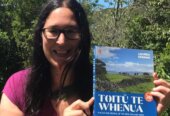
Cambridge was among 40 sites throughout the country that saw anti-1080 protestors calling on the government to put a stop to use of the controversial poison.
A small but passionate group of ‘Stop the Drop’ protestors brought the anti-1080 message to Cambridge on Saturday afternoon last weekend – part of a nationwide campaign against the controversial poison.
Local protest organiser Koreen Stanley said they had received good support for the cause, but also had people disagreeing with them during their protest on the Duke St roundabout in town. Protestor Bev Ashburner condemned the poison as inhumane. “It’s such a cruel way of dying, even for a pest,” she said.
The protestors were also concerned that the poison, used in aerial drops to contain mammals such as possums and rats, is contaminating waterways and killing non-target species such as native birds and deer. This was a view echoed throughout the country from 12 – 2pm that day, as thousands of people took to the streets to urge the Government to ‘Stop the Drop’.
What is 1080?
1080 is the common name for sodium fluoroacetate, it’s a synthetic poison but fluoroacetate is also produced naturally by some plants to prevent animal browsing.
What’s in the bait?
Cereal, sugar, flavour and dye are added to most of the 1080 pellets used for pest control in New Zealand, with the toxin making up 0.15 per cent of the bait.
Why are we using it?
The Department of Conservation says aerial 1080 drops are fast enough to protect vast, remote and rugged areas from pest population booms, such as during times of mass tree fruiting. They say that it is the only way to cover the terrain required and that it is cost-effective and poses little threat to the environment.
Anti-1080 campaigners disagree with this, saying that the aerial poison drops are contaminating waterways and killing native animals and birds, deer and domestic animals (such as dogs), not just the possums and rats it is aimed at.
Globally, New Zealand is the largest user of 1080, using around 80 per cent of the world’s supply. We have been using it since the late 1950s, importing it in its raw form from the United States.
New Zealand is unusual in that the only native mammals we have are bats, meaning introduced pests such as possums have no natural predators.








